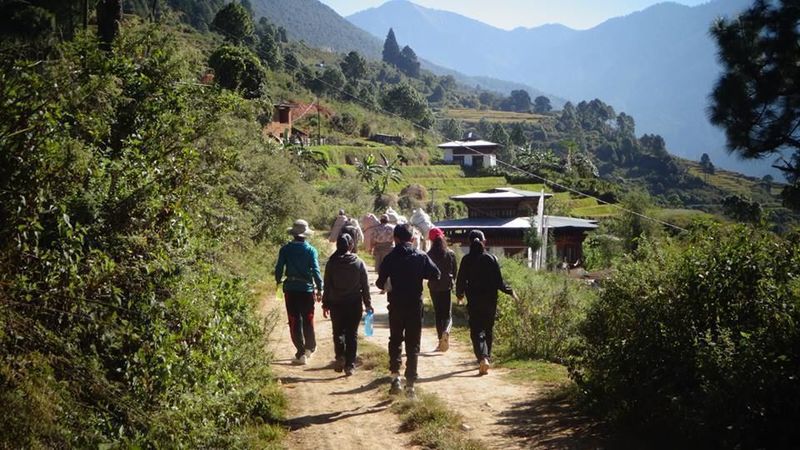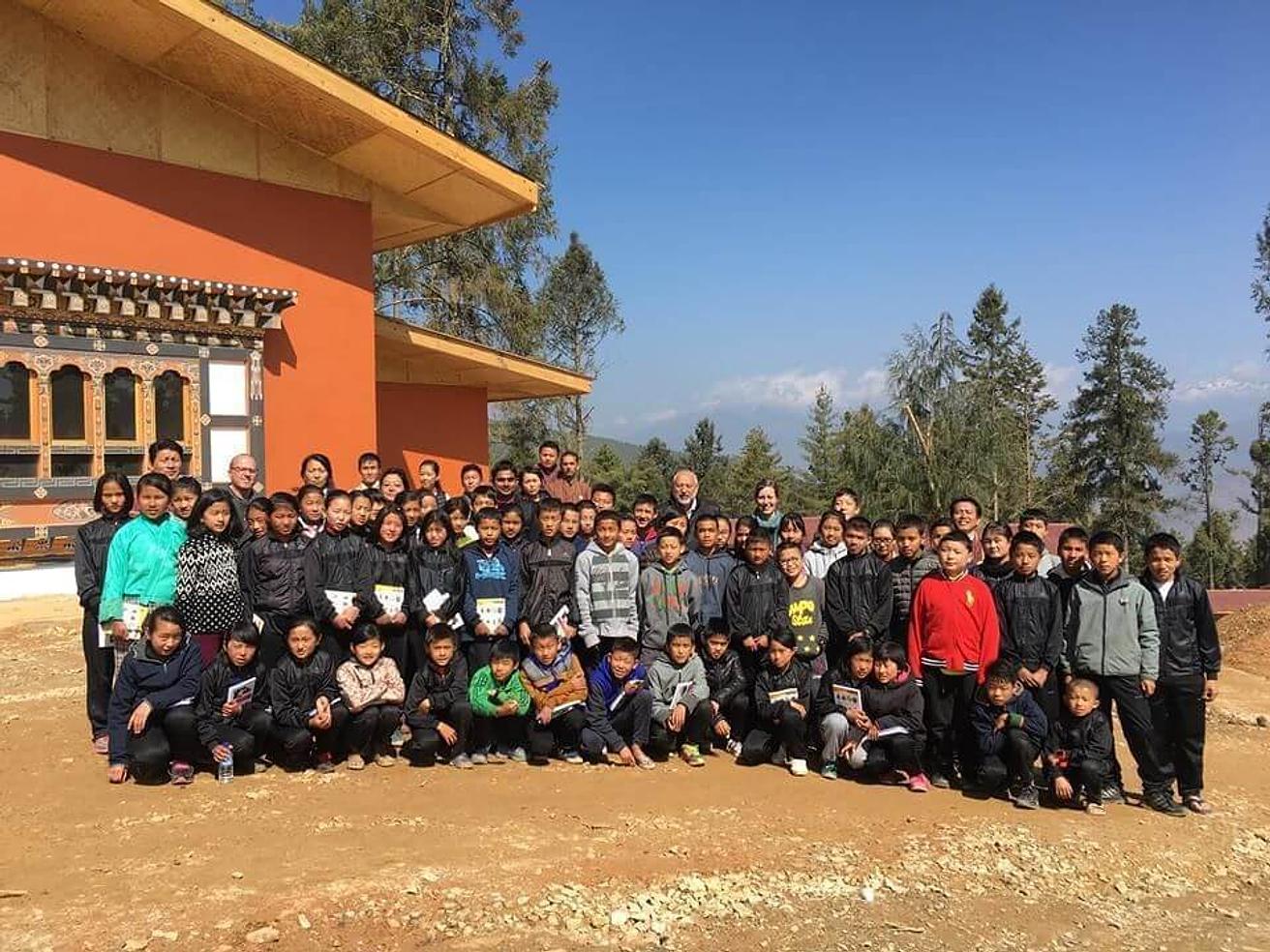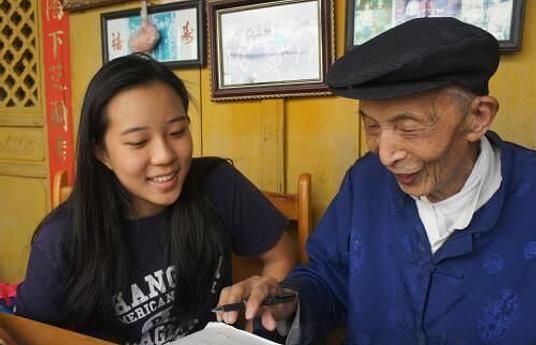In the dramatic, mountainous landscape of Bhutan a new school is pioneering the way for a better education. Supported by the King of Bhutan, The Royal Academy is managing to create a holistic educational experience which fully prepares children for any kind of future. The first in-take of children was in 2016, with 60% of the students coming from low socio-economic backgrounds and receiving scholarships to attend.
Although the school adheres to Bhutan’s national curriculum, this is used as a jumping point off of which to build a motivational and varied school day. Hemant Somasekharan, teacher and researcher at the school, told us ‘To the extent possible, we co-create the curriculum with the students. We ask them what they are interested in learning and based on that we devise our curriculum to incorporate both the national curriculum but much more too. The benefits of this are manifold. The students are interested in the content, which they have chosen, and we use that content as a means to teach them the skills and processes we’ve identified for learners to thrive in the world they will be living in.’
The school also centres its curriculum around 5 key areas of development – cerebral, physical, social, spiritual and emotional. The school sees this as the best way to help prepare kids for an uncertain future, as Hemant explains, ‘An education should not strive to prepare students for jobs but to thrive in the world. A job or career is merely one aspect of many different roles one has to perform over the course of their life. At the Royal Academy, we believe that the careers our students will be invested in are not invented yet. They are still in the making and we want our learners to chart that course of their journey while fulfilling their other roles as parent, child, sibling, spouse, citizen and a responsible human being. We feel the five areas of development will help a learner actualize his or her potential in all these areas.’
Equipping children for the future is something governments worldwide are starting to focus on, having realised that the traditional way of educating prepares children for a bygone era. ‘Unlike ever before, content is getting obsolete at a very rapid pace.' Hemant told us, 'By equipping our students with the requisite skills and processes, we ensure that they are in a position to tackle new evolving content, complexity and uncertainty.’

The school manages to stay at the forefront of education through a unique campus set-up. Not only are they a school, but they have a research centre and a teacher development centre which all feed into each other to keep their educational approach evolving.
Hemant explains, ‘Faculty at the school undertake action research each year to improve their own practice and contribute to overall outcomes of the school. The research center works closely with the faculty and provides support while also analyzing the data that emerges from this research. This is then fed to the teacher development center which works closely with the researchers and teachers to identify needs and areas for improvement. The focus is not solely on shortcomings but on strengths as well. If a member has been identified as being great at something, he or she is provided with an avenue to share their expertise with other members of the school and the wider community.’
Even though the school is forward-looking, the rich traditions of the Bhutanese are incorporated and honored at the school, which means that while students become globally minded they have a strong sense of cultural heritage and national identity too (something many countries around the world are focusing on). ‘The Bhutanese code of etiquette known as Driglam Namzha is one aspect of Bhutanese values we focus on.’ says Hemant, ‘This is a system of orderly and cultured behavior that are illuminated to the students to help them actualize their potential and be the best that they can be. There is also a lot of emphasis on compassion, tolerance, community engagement and empathy.’
These skills and cultural heritage are put into practice through volunteerism and their daily lives at the school. ‘Being a residential school, it is the students who take care of their dorms, classrooms and other aspects of our campus.’ explains Hemant.

Being independent and taking the initiative are ways of operating that are cultivated in the school. Students take ownership of their work and understand their individual impact on their own futures as well as the communities they live in. Hemant adds, ‘This is imparted through learning experiences that overlap between the social, emotional and spiritual areas of development. All learners at the Academy take part in community engagement events such as paddy & vegetable cultivation, environmental conservation, and cultural festivals. This gives our learners insights into the rich traditional values and practices that may be overlooked if in a traditional classroom setting. It contributes towards the preservation of local culture and heritage and also benefits the local community as we source our raw materials from them. It is a win-win situation as our learners get a hands-on experience, contributes to the community we live in and is able to relate local practices to the wider world we live in.’
So how can educators around the globe learn from The Royal Academy’s example? Hemant believes it’s all about moving towards a more dynamic and multidimensional approach, explaining that ‘a single-minded focus on academic learning has contributed to more problems than it has solved’ and that it is their multidimensional approach to education (particularly through the 5 areas of development) that will help students be prepared for the future as ‘the problems facing the world are not unidimensional but rather highly multidimensional.’
Not only do they break away from a single-track education system in favour of a more collaborative approach, but The Royal Academy stands out for continuing to question its own practices. ‘We are always trying to learn and in the future, we may come up with another element that enhances the five areas,’ Hemant concludes, ‘That is the core of our philosophy - we are constantly in learning mode.’
Find out more about the 5 Areas of Development and how to approach this unique concept in your school by heading to the project page.



